Chinese e-commerce platforms have become increasingly popular in recent years, with some of the biggest players including Tmall, JD.com, Pinduoduo, and Taobao. As China’s eCommerce market continues to grow in size and importance, international brands looking to expand their reach worldwide should consider investing in these top Chinese shopping sites. The Chinese eCommerce market is projected to reach 1.55 trillion dollars by 2024, an 80% growth from 862 billion dollars in 2019.
In this blog post, we’ll explore the key features and benefits of some of the most popular e-commerce platforms in China so you can make an informed decision on which one suits your needs best. So whether you’re an international brand looking for cross-border eCommerce opportunities or a local entrepreneur seeking new digital retail avenues – read on!
Key Takeaways
- China’s e-commerce market is a major player in the global online retail space, accounting for nearly 50% of all transactions worldwide.
- Top Chinese e-commerce platforms like Tmall, JD.com, Pinduoduo, and Taobao offer unique features and benefits tailored to different types of businesses looking to expand their reach into this vast digital landscape.
- By tapping into innovative tools such as group buying on Pinduoduo or cross-border trade on Kaola, marketing managers can take advantage of emerging trends within China’s flourishing e-commerce ecosystems while providing exceptional user experiences.
- WeChat stores and Xiaohongshu eCommerce also provide an effective way to engage directly with customers through social commerce opportunities.
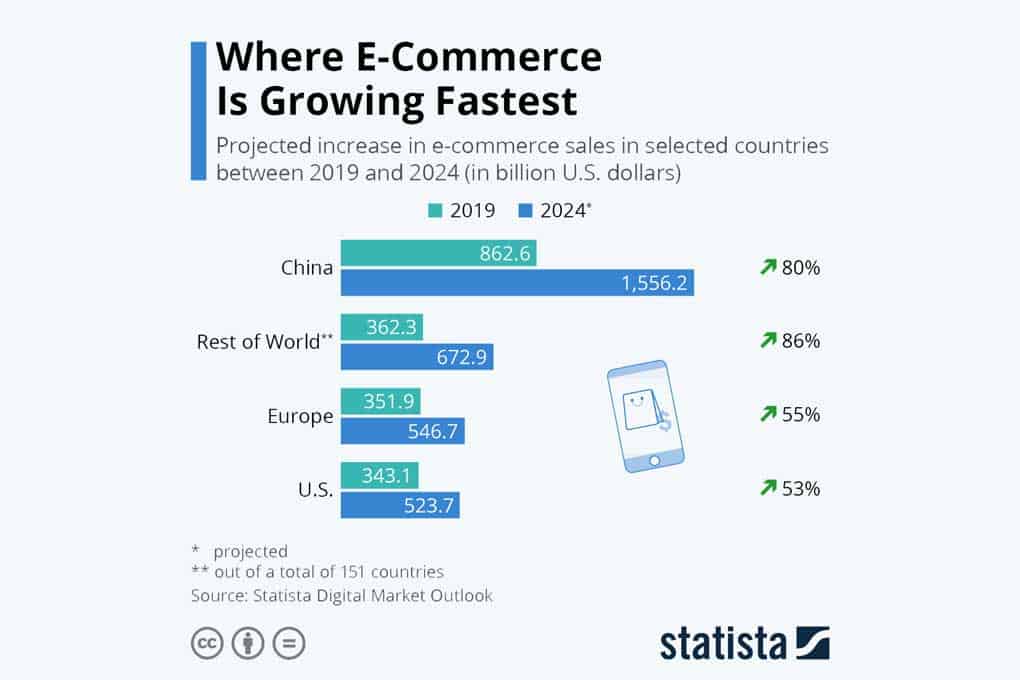
Background On E-commerce In China
E-commerce in China has not only grown exponentially in recent years, but it has also taken the world by storm. China now accounts for nearly 50% of all global online transactions.
One key aspect that sets China apart from other markets is its fully integrated ecosystems that seamlessly merge search, social media, and retail into powerful platforms.
This interconnected approach has transformed consumer behavior on multiple levels – from how they discover products and services to their preferred payment methods and even delivery logistics.
These innovative strategies have garnered tremendous success; however, it’s important to be aware of regulatory frameworks governing digital marketplace operations within China’s borders.
To legally conduct business via e-commerce methods in this market, operators must function as legal entities that provide services or sell goods over the Internet.
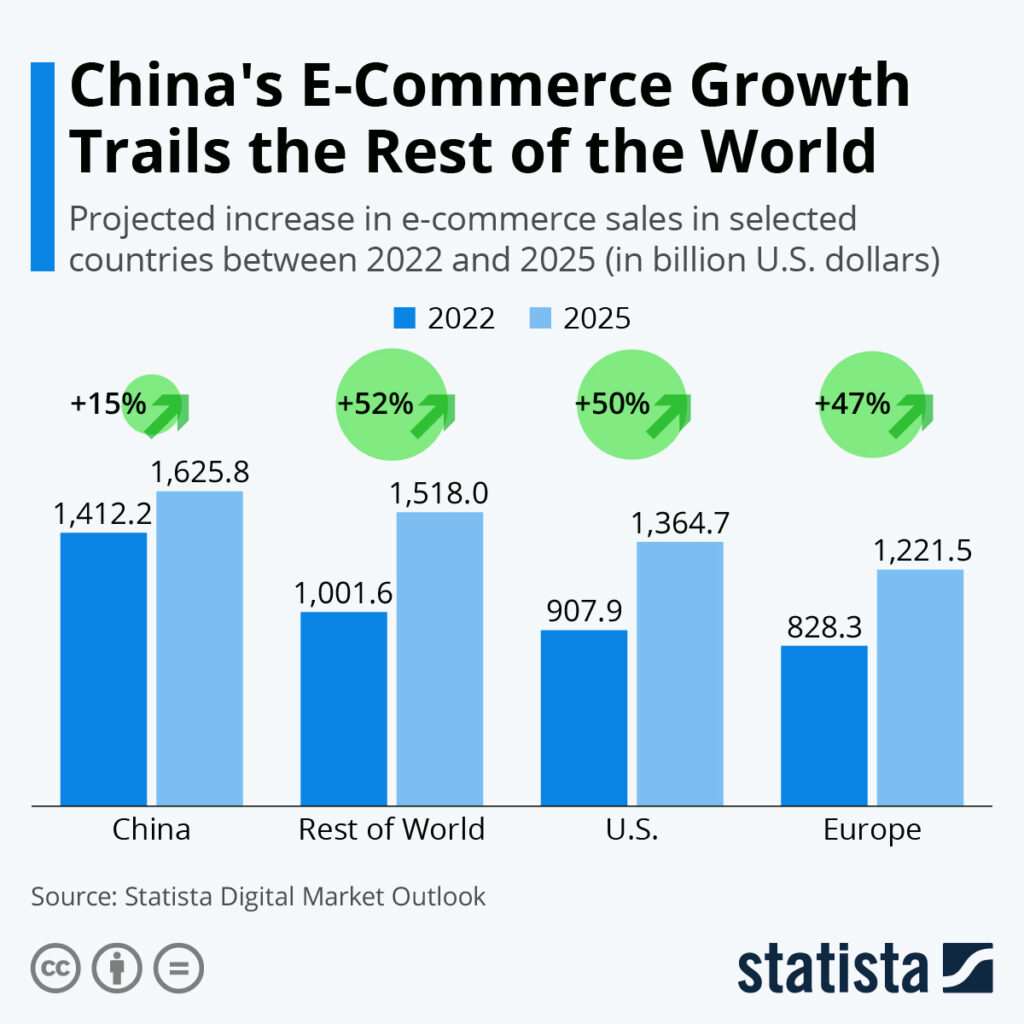
Why China’s E-commerce Market Matters For Businesses
It is estimated that companies selling their products on services on Chinese e-commerce platforms can increase their sales by at least 20% every year. Accounting for nearly 50% of all e-commerce transactions worldwide, this vast digital landscape offers an array of possibilities that are hard to ignore.
One key aspect contributing to the success of China’s e-commerce arena is its efficient logistics and customer service systems. Giants like Alibaba and JD.com have developed streamlined networks for delivery and order processing, making it easier than ever before to connect with millions of potential customers across the country.
The Chinese e-commerce landscape is also an amazing environment for foreign brands that want to sell through cross-border solutions, as the majority of online marketplaces and social e-commerce platforms offer opportunities for small, medium-sized, and big enterprises to enter the market without a Chinese business license and real presence in China.
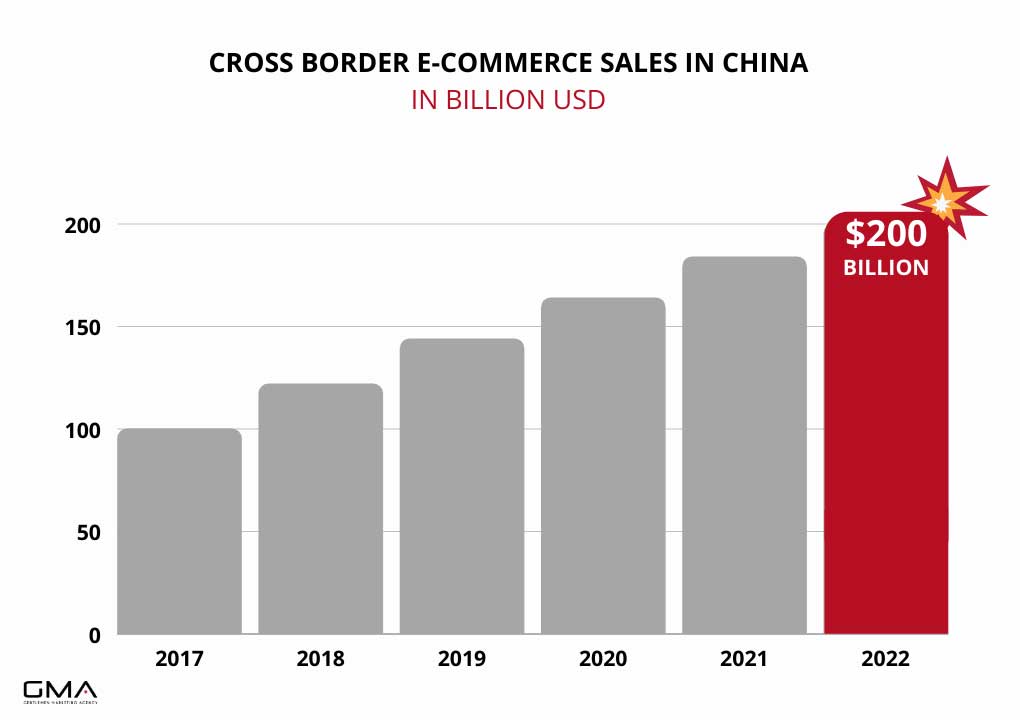
What Are The Top Chinese E-Commerce Platforms?
There are many ways for local and foreign companies to sell products to Chinese consumers. The choice of the platform will always depend on your target audience, product category, and budget. In this article, we will present a list of the most popular Chinese eCommerce platforms, with some insights into the e-commerce websites most suitable for different company types. Let’s take a look!
Tmall
Tmall, operated by Alibaba Group, is widely regarded as one of the best platforms for selling products in China. Known for its reputation and trustworthiness, Tmall offers access to a massive user base of active shoppers, providing businesses with an extensive reach.
The platform attracts a high-quality consumer base with strong purchasing power, making it an attractive choice for brands looking to tap into a lucrative market segment. The platform operates on B2C (business-to-consumer) system and is recording an estimated monthly traffic of 570 million.
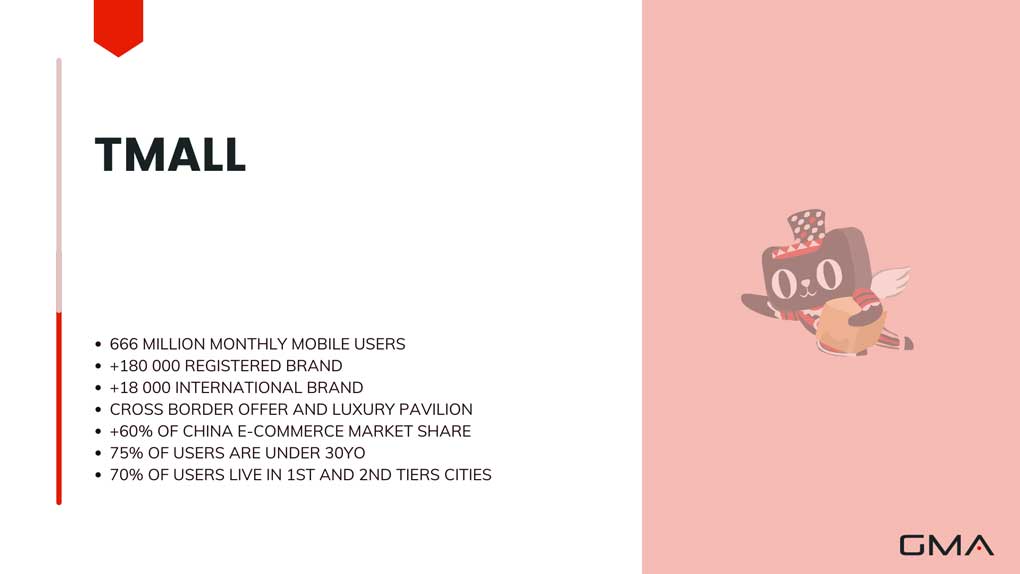
Tmall offers a range of branding and marketing opportunities to businesses, including the creation of customized flagship stores that enable brands to showcase their products, establish their identity, and engage with consumers.
With its emphasis on customer service, Tmall ensures a positive shopping experience by providing efficient customer support, dispute resolution, and after-sales services, fostering customer loyalty and encouraging repeat purchases.
For international brands and businesses, Tmall Global is a valuable platform within Tmall that facilitates cross-border e-commerce. It provides comprehensive support for overseas sellers, including logistics, marketing, and customer service, making it easier for international sellers to enter the Chinese market without the need for a physical presence in the country.
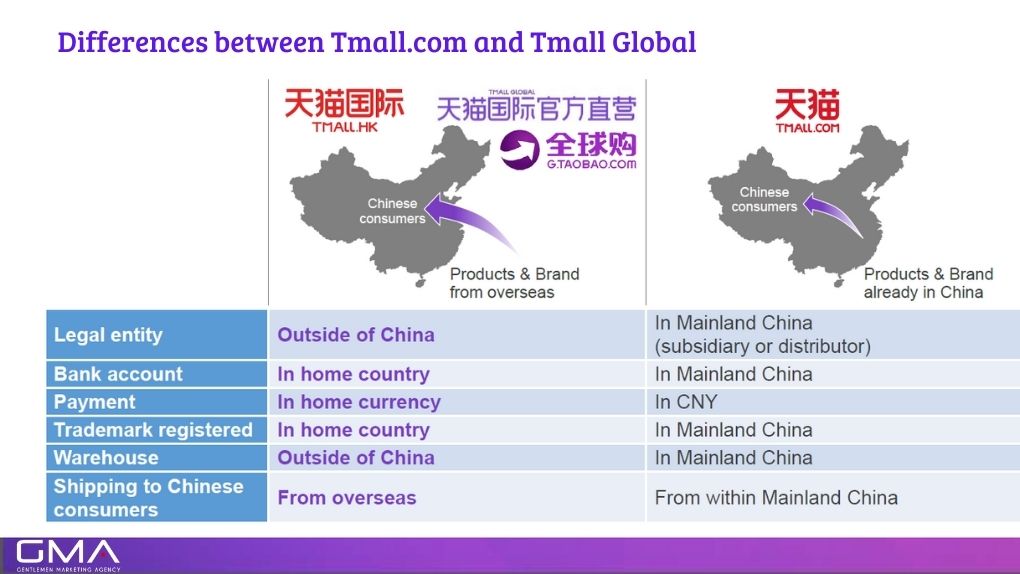
Tmall also offers robust data insights and analytics tools, enabling sellers to monitor sales performance, consumer behavior, and market trends. This data-driven approach empowers businesses to make informed decisions, optimize their marketing strategies, and tailor their product offerings to meet the specific demands of Chinese consumers.
Moreover, Tmall’s strong logistics and fulfillment infrastructure ensures efficient warehousing, inventory management, and order fulfillment, resulting in timely delivery and customer satisfaction.

Tmall is a very versatile platform and it’s definitely the best one in terms of visibility and quality. But it’s important to know that it’s also the most expensive platform in China’s e-commerce landscape, and due to the quality checks and premium profile of the site, it’s mostly suitable for:
- Big established brands with a strong presence in China
- International brands interested in selling cross-border on Tmall Global
- Luxury and premium brands
Niche and emerging brands will be better elsewhere (we will offer some solutions later in the article) because Chinese customers usually go for well-recognized local and international brands on the platform.
JD (Jingdong)
You’ve likely heard of JD.com or JingDong – the powerhouse e-commerce platform and logistics giant in China founded in 1998. With its impressive growth story fueled by a vast self-owned logistics network, JD.com is certainly not one to be ignored when expanding your business into the Chinese market.
JD.com is well-known for delivering a wide range of products across China, including fresh produce, frozen foods, and apparel. Beyond their core 1P business model where they sell items directly to consumers, they also offer a 3P marketplace similar to Amazon’s where third-party sellers can join and cater to the ever-growing customer base.
This makes it an excellent choice for businesses like yours looking to tap into this massive audience.
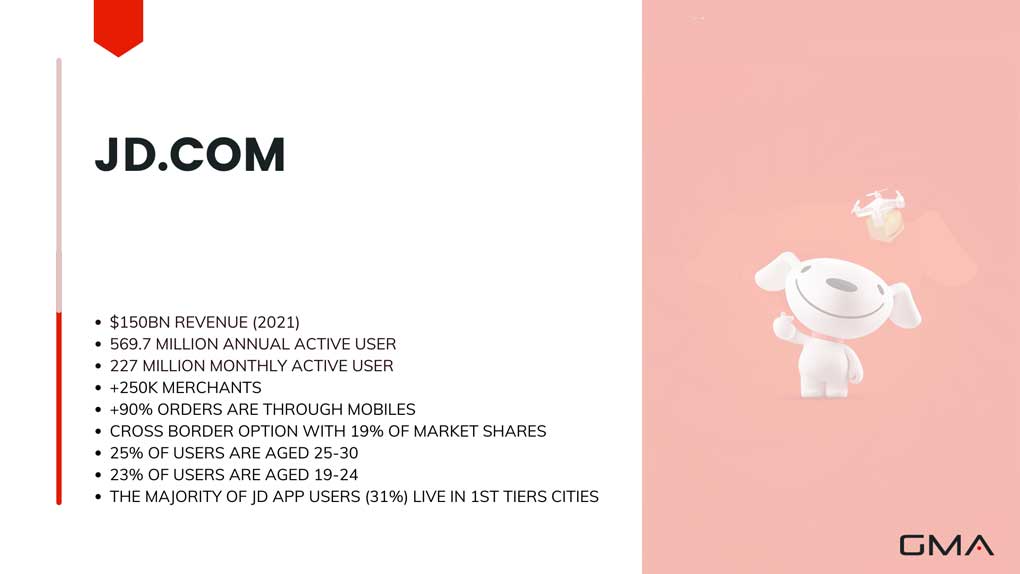
Furthermore, with online shopping continually evolving and becoming more sophisticated each day through features such as AI-driven personalization tools or visual search capabilities provided by JiSuDaZhao – JD’s subsidiary specializing in AR & VR; there are plenty of opportunities for our brand collaborators who want access over some cutting-edge retail technologies that enable seamless user experiences while reducing friction points throughout buyers’ journeys on sites like ours!
JD, just like its biggest competitor Tmall, also offers a cross-border solution for foreign brands. JD Worldwide allows international merchants to sell products without a physical presence in China. The company has the largest fulfillment: JD Logistics which provides business partners with supply chain solutions, including warehousing, delivery, and after-sales service.

Pinduoduo
Pinduoduo is a rapidly growing e-commerce platform in China. Established in 2015 by ex-Googler Colin Huang, it has quickly positioned itself as the third-largest player in the Chinese digital commerce landscape, with a respectable 7.3% market share and trailing just behind giants Alibaba and JD.com.
Pinduoduo’s innovative approach appeals to the retail industry by offering an extensive range of consumer goods – from daily groceries to household essentials – at highly competitive prices.
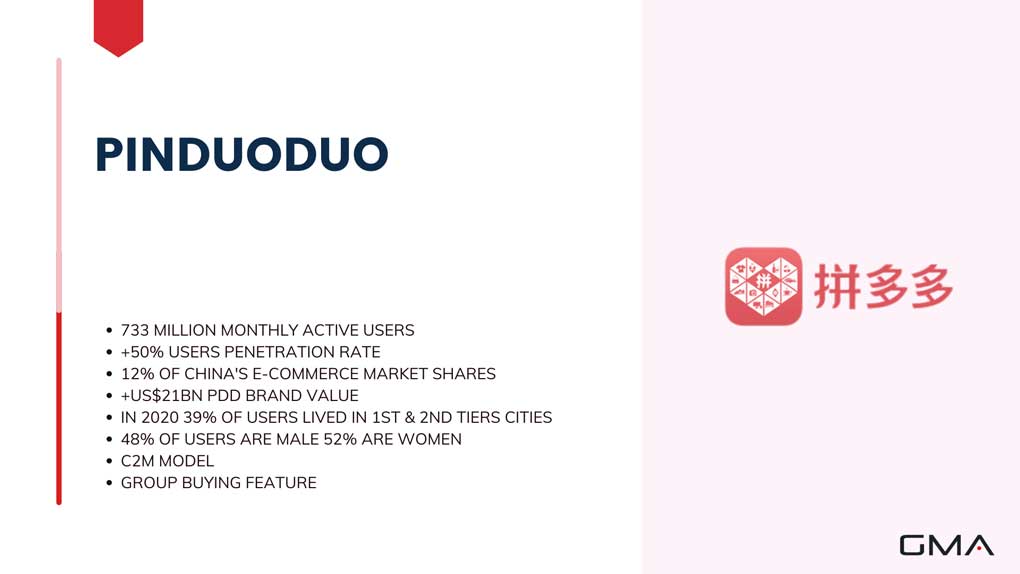
The estimated monthly traffic as of December 2022 was over 250 million, putting Pinduoduo close to the biggest competitors in the Chinese market.
The team purchase model incentivizes users to share product listings with friends and family via social media platforms like WeChat, thus increasing brand visibility while decreasing customer acquisition costs for merchants on the platform.

The group buying function was a definite win especially during the COVID-19 pandemic and lockdowns, when people started purchasing goods with their neighbors. In addition, when sharing offers on WeChat and inviting friends to group purchases, consumers can get gifts, discounts, and even free items.
Not only does Pinduoduo influence purchasing behavior among its millions of users in China, but it also has significant implications for businesses looking to penetrate this thriving e-commerce market segment.
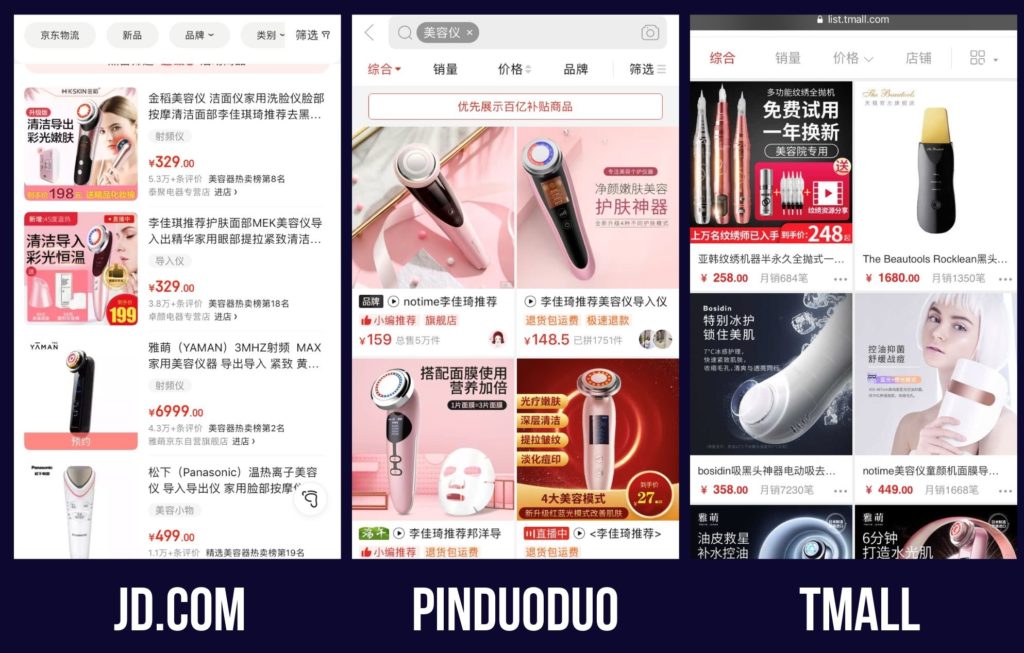
Taobao
Taobao is the largest consumer-to-consumer (C2C) e-commerce platform in China, owned by Alibaba. With a staggering 500 million registered buyers and sellers, it’s no surprise that Taobao makes around 50,000 sales per minute.
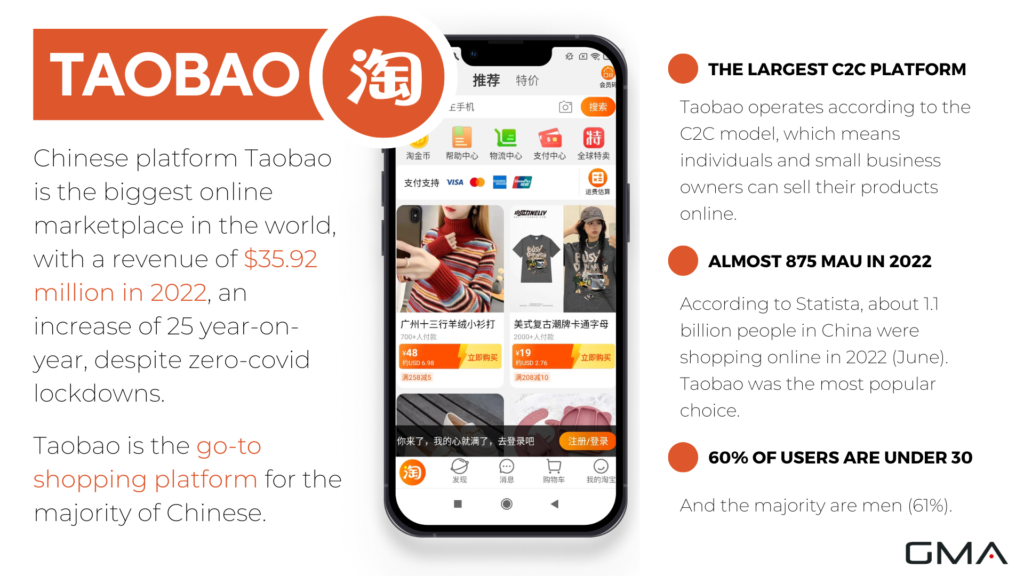
Compared to eBay, Taobao has fewer auctions and more fixed-price sellers. This structure helps provide stability for users looking to purchase products. For example, if you’re browsing for a new handbag from your favorite brand on Taobao, chances are you’ll find multiple options with similar prices.
As marketers looking to expand their business into China’s market should definitely consider using Taobao due to its incredible user base size and ability to cater to both large brands and smaller ones just starting out in the development phase of their business plan when considering selling goods in China’s bustling E-commerce market.
Recently, Taobao went through a rebranding phase, trying to position the platform more as a hub for entrepreneurs and young designers to gain recognition with a new affiliate program, Taoxiaopu.

Another important feature of Taobao is its live-streaming platform, Taobao Live. The program was launched in collaboration with Weibo, one of the biggest social media platforms in China and today is already one of the most popular live-streaming sites for brands and influencers.
Kaola
This online marketplace offers international trade opportunities for businesses looking to sell their products to Chinese consumers.
Launched in 2015 by Nasdaq-listed NetEase, Kaola was later acquired by Alibaba for $2 billion in 2019. According to market share data, Kaola.com is the leader among online cross-border retail platforms with 21.4% of the total market.
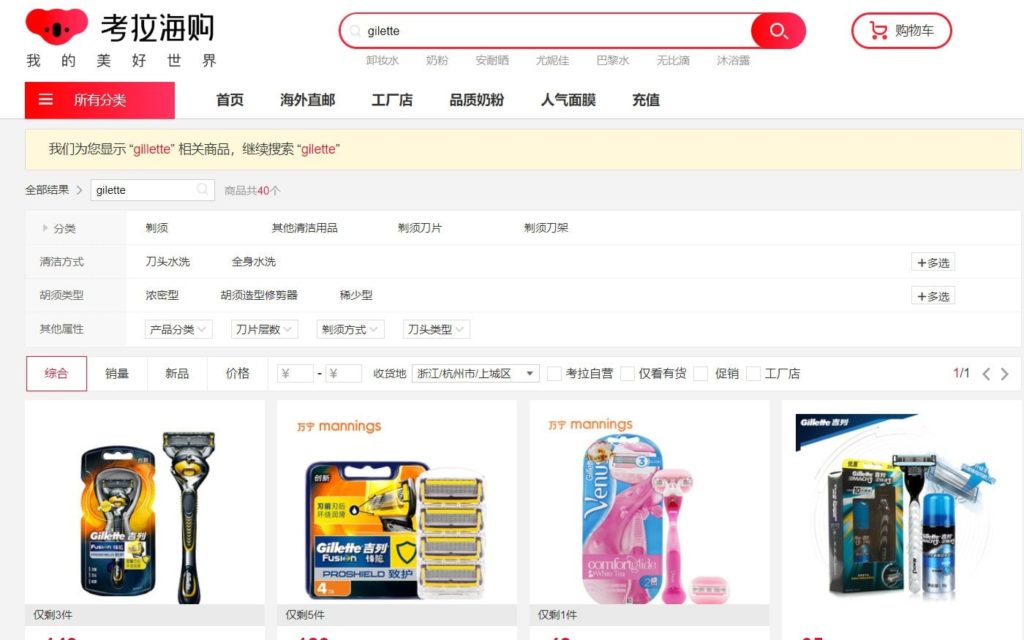
It’s known for featuring genuine, high-quality products from international brands, which is possible thanks to having multiple purchasing teams in big cities like Tokyo etc, that negotiate directly with manufacturers.
In summary, as a reputable and secure e-commerce platform specializing in selling Western products targeting middle-class consumers in China, Kaola is definitely worth considering if expanding into this increasingly lucrative market is important for your business growth strategy.

WeChat Stores
WeChat stores are a type of social e-commerce that exists within the WeChat lifestyle-sharing platform. They allow businesses to create online storefronts that are connected to their WeChat Official Accounts, providing an easy way for marketers to get their products in front of potential customers.
WeChat stores can be built in-house but can be also done through third-party providers, so you don’t need to worry about building one. One popular third-party WeChat e-commerce platform is Youzan, which has become the largest provider of this type of service in China with revenue exceeding 1.8 billion CNY.

As mobile commerce continues to grow in popularity and importance, social commerce has also emerged as an increasingly important factor for companies looking to succeed in Chinese markets.
WeChat stores’ main advantage is that they can compete well with all big Chinese eCommerce platforms while offering cost-effective solutions. This means, that it’s one of the best solutions for small and niche brands that want to enter the market and test the grounds before deciding to feature products on Tmall or JD.

Xiaohongshu (Little Red Book)
Xiaohongshu is a platform you need to know. With over 200 million monthly active users, the social media and e-commerce platform offers unique features that combine both aspects seamlessly.
Not only does Xiaohongshu offer influencer marketing opportunities for businesses, but it also operates RED Mall where international products can be sold directly to Chinese consumers.
With the majority of its users born after the 1990s, this tool is especially effective when targeting Millennials and Gen Z in China who have high engagement rates on the app.
It’s a platform suitable for small and big brands, especially in the fashion and cosmetics industries, as the majority of users are women interested in reading reviews and watching live streams of the products they are thinking of buying. RED Mall is also one of the cheapest options in comparison to the top e-commerce platforms in China.

VIP Shop
You may want to consider VIP.com as one of the top e-commerce platforms in China. VIP Shop is the third-largest e-commerce platform and specializes in flash sales and pre-ordering bulk products from excess inventory at discounted prices.
VIP International is also a cross-border sub-platform of VIP Shop that focuses on online discount sales and was founded in 2008 in Guangzhou.

For brands selling on the platform, there are many benefits including brand partnerships and international sales opportunities.
Overall, if you’re interested in tapping into the Chinese market for your business or promoting your fashion-related products, considering using VIP.com should definitely be on your radar.
Suning.com
Suning.com is one of the largest Chinese e-commerce platforms, ranking among the top B2C companies in China. It offers a vast range of physical merchandise on its online shopping platform and operates over 10,000 stores across China and Japan.
The company has more than 1,600 stores spread across over 700 cities in China and Japan, making it one of the most extensive multichannel retailers in the country. Its focus on consumer electronics has helped to solidify its position as a leading player within this market segment.
Given such success and retail expansion efforts, Suning.com presents an attractive option for businesses looking to enter or expand into the Chinese e-commerce market.
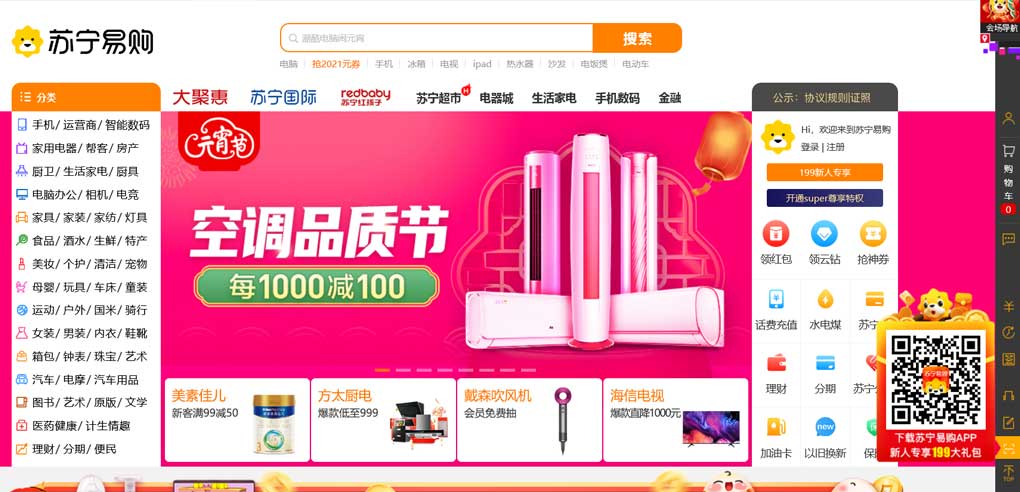
What Are The Key Trends Driving eCommerce Growth in China?
Several key trends are driving the growth of Mainland China’s e-commerce market. These trends include:
Mobile Commerce
The widespread adoption of smartphones and mobile internet has fueled the growth of mobile commerce (m-commerce) in China. Consumers increasingly prefer to shop and make purchases through mobile devices, leading to a surge in mobile shopping apps and mobile payment systems.
Social Commerce
Social media platforms and messaging apps have integrated e-commerce functionalities, enabling consumers to discover, share, and purchase products seamlessly. Chinese consumers heavily rely on social commerce platforms to explore product recommendations, reviews, and promotions shared by their social networks.

Live Streaming Shopping
Live streaming has emerged as a powerful e-commerce tool, with influencers and brands showcasing products in real time and engaging directly with consumers. Live streaming shopping events generate high levels of consumer engagement, excitement, and impulse purchases, contributing to e-commerce market growth.
Rural E-Commerce
The Chinese government has actively promoted rural e-commerce initiatives, aiming to bridge the urban-rural digital divide and stimulate economic growth in rural areas. E-commerce platforms have expanded their reach to rural markets, offering agricultural products, local specialties, and online entrepreneurship opportunities for rural residents.
O2O (Online-to-Offline) Integration
Online-to-Offline integration has become a prevalent trend in Mainland China’s e-commerce market. E-commerce platforms have partnered with brick-and-mortar retailers, allowing consumers to purchase products online and pick them up at physical stores. This integration enhances convenience, improves customer experience, and combines the benefits of online and offline shopping.

Personalization and AI
E-commerce platforms in China leverage advanced technologies, including artificial intelligence (AI), to provide personalized shopping experiences. AI-powered recommendation systems, chatbots, and virtual assistants offer tailored product suggestions, customer support, and personalized marketing, enhancing customer engagement and loyalty.
Logistics and Delivery Innovations
To meet the growing demand for efficient and timely deliveries, logistics and delivery companies in China have embraced innovations such as same-day delivery, smart lockers, and drone deliveries. These innovations have significantly improved the overall e-commerce experience, driving market growth.
These key trends collectively contribute to the growth and transformation of Mainland China’s e-commerce market, offering new opportunities for businesses, improving consumer convenience, and reshaping the retail landscape in the country.
Contact Us to Start Selling In China!
In conclusion, the Chinese e-commerce market is a goldmine for businesses looking to expand their reach and tap into new opportunities. With numerous platforms available, including Tmall, JD.com, Pinduoduo, Taobao, Kaola, WeChat Stores, Xiaohongshu (Red), Douyin, VIP.com and Suning.com – there is no shortage of options for brands to explore.
The China eCommerce landscape presents both challenges and unique opportunities with its diverse payment methods and cross-border commerce facilities. We are here to help you navigate this complicated area.

We are a China-based marketing agency specializing in digital marketing and e-commerce solutions for Western brands in the Chinese market. We have more than 10 years of experience and know-how. If you’re interested in selling on Tmall, we are also a certified Tmall Partner that is needed to enter the platform.
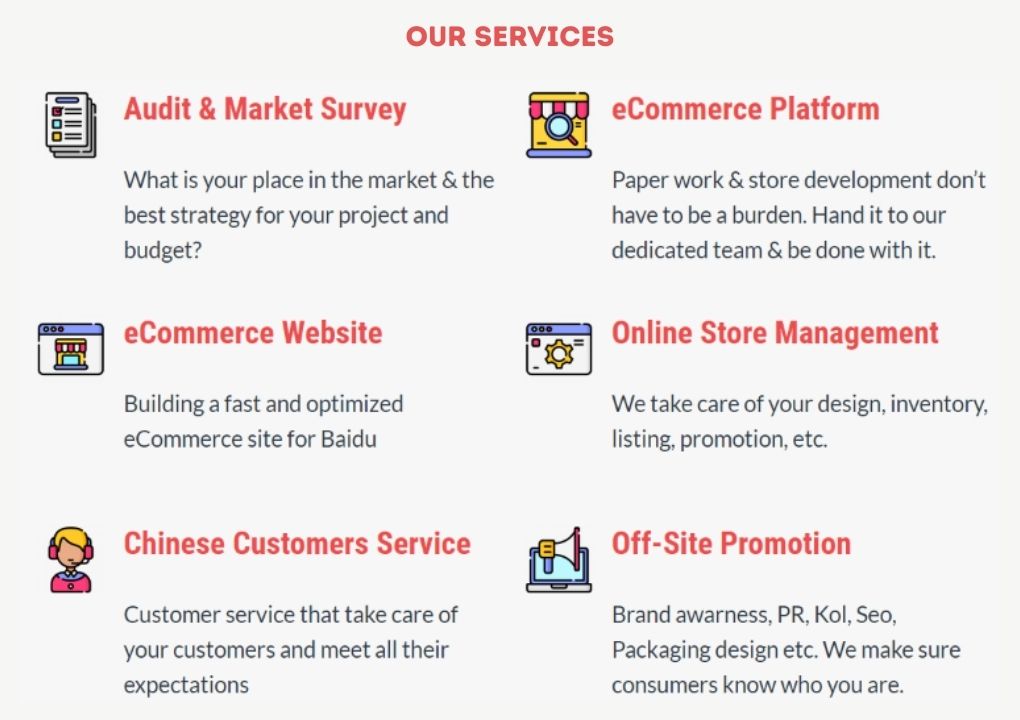
It’s vital that marketing managers stay abreast of the latest trends in Chinese online retailing; they can gain an edge over their competitors by leveraging these insights effectively. If you’d like to join the Chinese eCommerce world, contact us and we start working on your success today!



1 comment
Azeem Akhtar
We are manufacturer of wooden handicrafts in Pakistan. We want to expand our business in China.